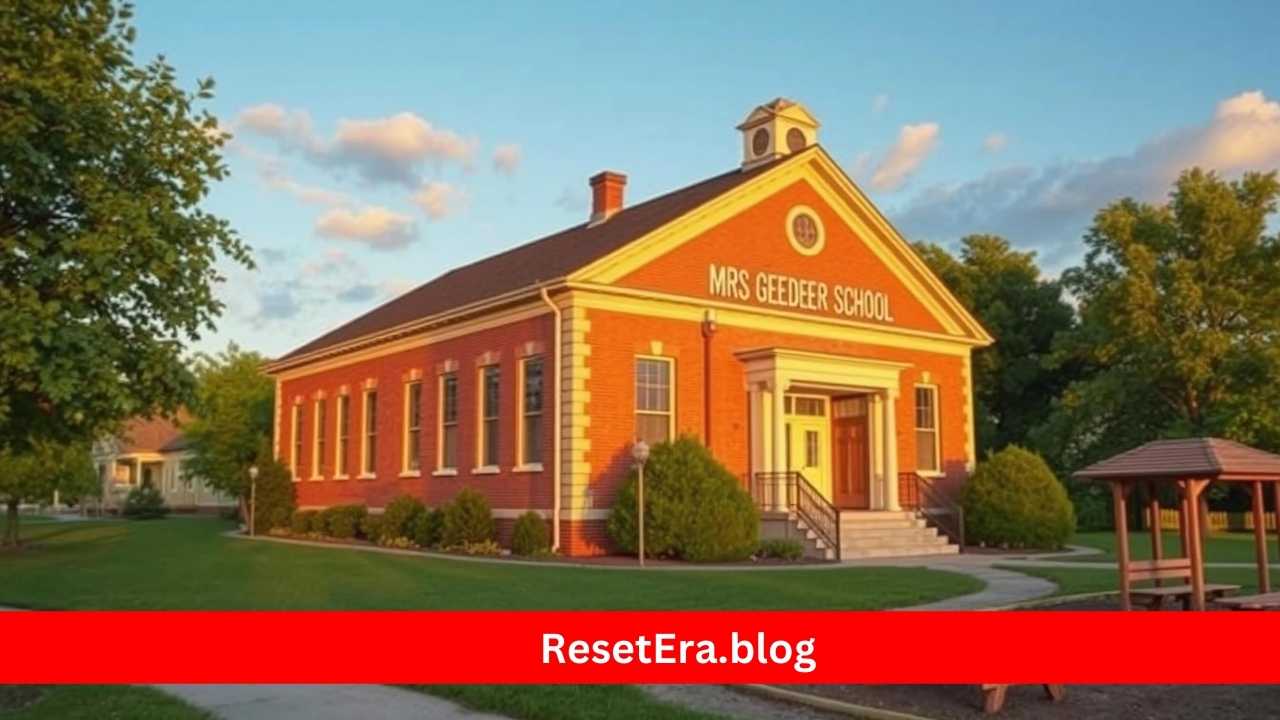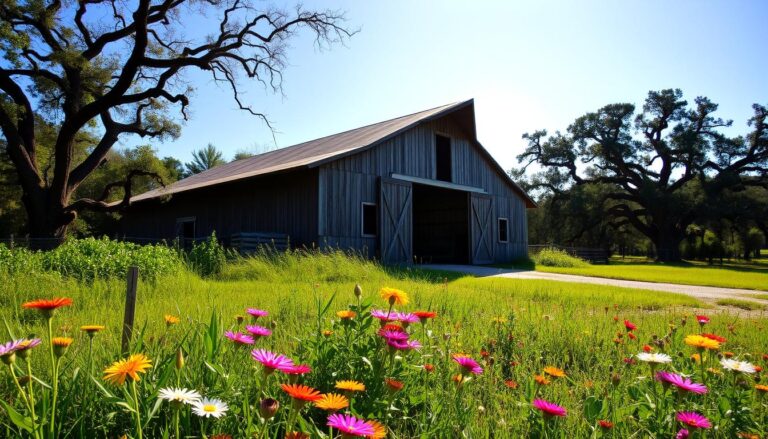
Mrs. Geeder Rosenwald School
The Mrs. Geeder Rosenwald School shows how education helps communities grow. It was part of the Rosenwald School program. This program gave quality education to African American students when segregation was common.
Julius Rosenwald, a wealthy businessman, and Booker T. Washington worked together. They wanted to improve education for Black students in the South.
The Mrs. Geeder Rosenwald School followed the Rosenwald initiative’s goals. It taught both academics and practical skills. This was in the early 1920s.
The school’s curriculum was well-rounded. It included traditional subjects and skills for everyday life. This helped students and their families a lot.
Introduction to the Rosenwald School Initiative
Julius Rosenwald was a big businessman and giver. He teamed up with Booker T. Washington, a famous African American teacher. Together, they started the Rosenwald Fund. It helped build schools for Black communities in the American South.
Julius Rosenwald’s Vision for Educational Equality
Rosenwald thought good education was key for African American communities. He worked hard to fix the big education gap during segregation. The Rosenwald School Initiative started in 1917. It aimed to build many schools for Black students who didn’t have good places to learn.
The Significance of Rosenwald Schools in Segregated America
From 1917 to 1932, the Rosenwald Fund built over 5,000 schools and homes. These schools were a light of hope for Black kids. They helped Black families get better jobs and wealth.
The Rosenwald Schools did more than teach. They were centers for community activities and learning. The schools were built to let in lots of light. They also had special areas for learning skills for jobs.
Mrs. Geeder: A Trailblazing Educator
Mrs. Geeder was a remarkable African American teacher. She worked hard to educate students during the segregation era in the United States. Born in a time when African Americans had few educational chances, Mrs. Geeder saw teaching as a way to help her community.
She taught at a Rosenwald School, which was a special school for African American kids. Mrs. Geeder fought for equal education for her students and the African American community. She believed in the power of learning to change lives.
Mrs. Geeder was dedicated to her students. She knew education could help them overcome poverty and inequality. Her teaching methods were new and focused on the students’ growth and love for learning.
But Mrs. Geeder did more than teach. She was a leader in her community. She worked with groups to improve education and support African American families. Her work inspired many to fight for education justice.
Mrs. Geeder’s work still inspires today. She showed that one person can make a big difference in education. Her story reminds us of the power of commitment to helping others.
The Mrs. Geeder Rosenwald School
The Mrs. Geeder Rosenwald School was a key part of the Rosenwald initiative. It showed a big commitment to African American education. Located in Chicago, it was a big step for the project. It helped urban areas with segregated communities.
Community Involvement and Ownership
The school was built with love from the community. People, led by Mrs. Geeder, gave land, money, and hard work. This made the school a place where everyone felt proud and wanted to learn.
Architectural Design for Conducive Learning
The school’s design was made to help students learn well. It had big classrooms and lots of natural light. This made it a great place for students to grow and learn.
A 2011 study showed the school helped a lot. It found that students in the Southern Black community did better. This shows how good the school’s design and community support were.
The Mrs. Geeder Rosenwald School shows the power of community education. It shows how good design can help students grow, even in hard times.
Educational Programs and Impact
The Mrs. Geeder Rosenwald School had a special curriculum. It helped students grow in many ways. They learned math, science, and literature, and also got training in skills like farming and building.
This mix of learning helped students for school and work. It was a big help for African-American students.
Holistic Approach to Academic Excellence
The school’s plan was to make students smart and skilled. They learned by doing, not just reading. This way, they got ready for jobs and life.
Many students say their school helped them get jobs. They made a big difference in their communities.
The school had a special room for hands-on learning. It followed Booker T. Washington’s idea. The school’s design also helped students learn better, with lots of light and good classrooms.
Many students became leaders because of this school. They became teachers, professionals, and leaders. The school’s focus helped them a lot.
Read our Previous blog – Name That Means Lioness Nyt
Challenges and Resilience
The Mrs. Geeder Rosenwald School made big contributions to African American education. But, it faced many challenges. Money was a big problem, making it hard to get books and good teachers.
The time of segregation made things even harder. Laws and practices were unfair, making it tough to give students a good education.
The community helped the school a lot. They held events and worked together to keep it going. This showed how strong African American families were in wanting their kids to learn.
Studies show that good education is key for African American students. It helps them grow and become good citizens. Things like high hopes, diverse schools, and supportive parents are very important.
Even today, schools in the US are not fair for everyone. African American and Latino students often go to schools that are not as good. They don’t have as many chances to learn new things.
The story of the Mrs. Geeder Rosenwald School is very inspiring. It shows how important community support is. It reminds us to keep working for equal education for all.
The Role in the Civil Rights Movement
The Mrs. Geeder Rosenwald School was key in the Civil Rights Movement. It was a place for activism and organizing. The school taught about social justice and civic duty.
At the school, important events like voter drives and meetings happened. It was a spot for civil rights activists. Teachers and students worked together for racial equality.
The school stood for African American strength and will to fight against segregation. It was part of the Rosenwald School initiative. This initiative aimed to give quality education and empower African Americans.
The Mrs. Geeder Rosenwald School made a big impact on the fight for racial equality. Its work in social justice and activism is still inspiring today. It shows the importance of education and civic action.
Preservation and Restoration Efforts
The Mrs. Geeder Rosenwald School is getting a lot of attention lately. People want to save this historic black school. They want to keep its educational history alive.
Local groups are leading the effort to make the school a cultural and educational hub. They want to keep the building’s original look. At the same time, they aim to make it a place for learning and culture.
Honoring the Legacy through Restoration
The community is working hard to restore the school. They are studying the school’s history and design. This way, they can make sure the restoration is done right.
They want to honor the school’s past. They also want it to be ready for the future. This way, the school can continue to inspire and teach.
| Key Statistics | Figures |
| Rosenwald Schools Established | Over 5,000 |
| African-American Children Educated | More than 660,000 |
| Rosenwald Schools Listed on the National Register of Historic Places | More than 60, including the Mrs. Geeder Rosenwald School |
| Repurposed Rosenwald Schools as Community Centers, Museums, and Cultural Hubs | Several |
The community is very dedicated to saving the Mrs. Geeder Rosenwald School. They want to keep its educational history alive. This way, the school can continue to inspire and teach future generations.
Mrs. Geeder Rosenwald School as a Cultural Center
The Mrs. Geeder Rosenwald School was more than a school. It was a place where the African American community came together. Families met here for events and celebrations, making their community stronger.
This school was key in keeping African American culture alive. It was where people could celebrate their heritage and share traditions. The school had music, art, and community events, helping people connect and find their identity.
| Event Type | Frequency | Attendance |
| Music Performances | Monthly | 200+ community members |
| Art Exhibits | Quarterly | 150+ visitors |
| Community Meetings | Bi-weekly | 100+ residents |
The Mrs. Geeder Rosenwald School was very important to the African American community. It was a place where people could celebrate their heritage and feel part of a community. This made it a vital part of their lives.
Inspiring Future Educators and Initiatives
The Mrs. Geeder Rosenwald School is more than just a place of learning. It has inspired many to become great teachers. They were motivated by Mrs. Geeder’s dedication to education and helping the community.
These teachers have made a big impact on education. They have helped many students learn and grow. They keep Mrs. Geeder’s dream alive by teaching others.
The school’s way of teaching has influenced new programs. Places like the Annenberg Challenge have followed its lead. They focus on learning, arts, and community involvement.
These efforts show how schools can change lives. They make sure everyone has a chance to learn. This is what Mrs. Geeder wanted.
Carrying Forward Mrs. Geeder’s Mission
Today, the Mrs. Geeder Rosenwald School still inspires many. Its graduates are now teachers, leaders, and advocates. They work hard to make sure everyone gets a good education.
Through their efforts, Mrs. Geeder’s vision lives on. It changes lives and helps communities grow. This is her lasting legacy.
| Initiative | Impact |
| Annenberg Challenge | Generated over $600 million in matching grantsImpacted over 1.5 million childrenHired over 1,000 teachers of music, art, and dance in New York CityExpanded professional development opportunities for tens of thousands of educators |
| Rosenwald Schools Initiative | Funded the construction of over 5,300 buildings for African American students in 15 statesProvided seed grants and community contributions to build these schools |
The Enduring Legacy of the Mrs. Geeder Rosenwald School
The Mrs. Geeder Rosenwald School’s legacy is more than just a building. It shows how important good education is for everyone. It makes us think about educational equity today.
This school’s story tells us about the strength of African American communities. It shows how education can change a society for the better.
The impact of Rosenwald schools on African American education history is huge. They gave chances to learn to groups that were left behind. The Mrs. Geeder Rosenwald School was a light of hope for many.
Today, the lessons from this school help us fight for fairness and education. It shows us that educational equity is key for a fair world. By remembering this school, we aim for a future where every child can learn and grow.
The mrs. geeder rosenwald school legacy shows the strength and dedication of African American people. Its story motivates us to work together. We can break down old barriers and create a fairer world through education.
In Short
The Mrs. Geeder Rosenwald School is a key part of African American education history. It was made possible by Julius Rosenwald and Mrs. Geeder’s hard work. This school gave educational equity to many, helping the African American community a lot.
This school’s story shows us the strength of local leadership and community-based initiatives. It shows how important these are in solving big problems. The school’s significance in the Rosenwald schools legacy is huge. It highlights the role these schools played in education and community pride.
Looking back at the Mrs. Geeder Rosenwald School, we see its lasting effect. It shows how one place can change education and fight for educational equity. Its legacy teaches us about the power of education and the need for all kids to have what they need to do well.
FAQs
What was the Mrs. Geeder Rosenwald School?
The Mrs. Geeder Rosenwald School was a school for African American students. It was part of the Rosenwald School initiative. This initiative aimed to give quality education during the segregation era in the South.
Who was Julius Rosenwald and what was his role in establishing the Rosenwald Schools?
Julius Rosenwald was a businessman and philanthropist. He worked with Booker T. Washington to help Black students in the South. He started the Rosenwald Fund. This fund helped build over 5,000 schools for African American students from 1917 to 1932.
Who was Mrs. Geeder and what was her contribution to the school?
Mrs. Geeder was a dedicated teacher and education advocate. She worked in many Rosenwald Schools across the South. She believed education could help break poverty and inequality in African American communities.
How did the community contribute to the Mrs. Geeder Rosenwald School?
The community gave land, labor, and resources to build and keep the school. This made the community feel like they owned the school. They worked together to improve their youth through education.
What were the educational programs and curriculum offered at the Mrs. Geeder Rosenwald School?
The school offered programs that helped students grow in all ways. They learned traditional subjects and skills like agriculture and carpentry. This prepared them for school and work.
How has the legacy of the Mrs. Geeder Rosenwald School continued to inspire and educate?
The school’s legacy is still important today. It shows the value of education for all. It reminds us of African American communities’ strength and the power of education to change society.
Keep in touch with – ResetEra.blog






